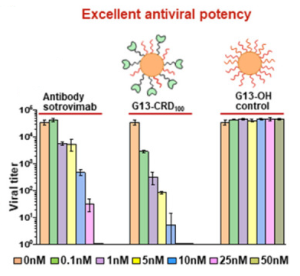A group from School of Chemistry and Astbury Centre for Structural Molecular Biology, University of Leeds, United Kingdom, etc. has reported about neutralization of SARS-CoV-2 using polyvalent Nano-Lectin.
https://www.ncbi.nlm.nih.gov/pmc/articles/PMC10302749/
The SARS-CoV-2 S protein trimer is heavily glycosylated with 22 N-linked glycans on each monomer subunit, consisting of oligomannose, hybrid, and complex glycans. Mutations in spike (S) protein epitopes allow SARS-CoV-2 variants to evade antibody responses induced by infection and/or vaccination. In contrast, mutations in glycosylation sites across SARS-CoV-2 variants are very rare, making glycans a potential robust target for developing antivirals. So, it was thought that lectins could be potentially potent antiviral activity against SARS-CoV-2 variants.
It is know that DC-SIGN carbohydrate recognition domain (CRD) binds specifically to mannose- and fucose-containing glycans found on virus surfaces, including SARS-CoV-2, with low to moderate monovalent affinities (Kd’s: 0.1–3 mM). In order to increase the affinity of the lectin DC-SIGN, the DC-SIGN CRDs were conjugated with Gold nanoparticles (GNP). 13 nm Gold nanoparticles (G13) were synthesized by citrate reduction of H[AuCl4], and first partially PEGylated. Then, these G13s were incubated with linker-labeled DC-SIGN CRDs.
As a result, it was shown that G13-DC-SIGN CRD, as the 1st polyvalent nano-lectin, has broad activity against SARS-CoV-2 variants.

